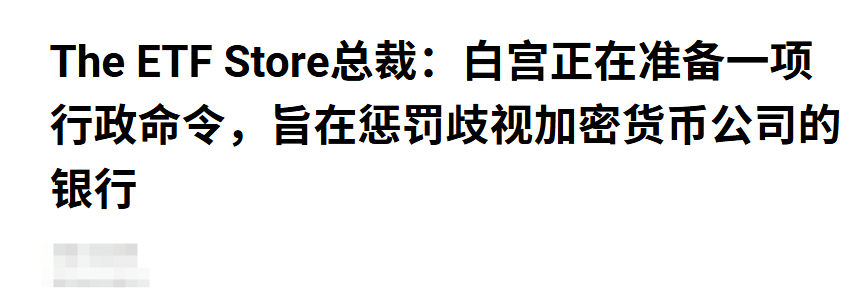Earthquake warning in the crypto world! The White House is secretly preparing an executive order that could disrupt the industry landscape—according to authoritative sources, the White House is drafting an executive order targeting banks, with the core objective aimed at 'punishing financial institutions that discriminate against cryptocurrency companies', and clearly requiring the Federal Reserve and other regulatory agencies to revoke their 'colored glasses' policies towards crypto firms. If this news materializes, it will become the strongest 'policy endorsement' from the U.S. government towards the crypto world since Trump signed the first crypto executive order, and it could even trigger a chain reaction in the global cryptocurrency market!

Three core highlights of the executive order: the end of bank discrimination is here!
Bank discrimination against crypto enterprises? Fines + accountability will be enforced together!
According to the draft executive order, the White House will instruct banking regulatory agencies to thoroughly investigate whether financial institutions have violated the (Equal Credit Opportunity Act), focusing on cracking down on banks that refuse to open accounts, provide loans, or payment services to crypto companies under the pretext of 'industry attributes'. For example, the previous case where Custodia Bank was denied a master account by the Federal Reserve due to its involvement in crypto business may become history! Once banks are found to discriminate, they will face hefty fines, regulatory penalties, and even the risk of license revocation, meaning traditional financial institutions must reassess their cooperation strategies with the crypto industry, significantly lowering the threshold for crypto enterprises to obtain banking services!

The integration of DeFi and mainstream finance is accelerating, and regulatory boundaries are clearly defined for the first time!
The draft executive order clearly states that 'regulation should be based on actual control behavior, rather than simply defining it as a monetary service business just for developing software'. This statement directly addresses the regulatory pain points of DeFi—future DeFi protocols may no longer be universally defined as 'illegal financial instruments', but instead be categorized based on whether they actually control user assets and participate in transaction processes. For example, DEXs like Uniswap.
If they only provide code and do not engage in transactions, they may be able to avoid some regulatory risks. This clears policy barriers for the large-scale integration of DeFi into the traditional financial system, and institutional fund entry channels may be completely opened!
Global expansion of dollar stablecoins gains further policy support!
The executive order reiterates 'full support for dollar stablecoins becoming global payment tools' and requires comprehensive implementation of the (GENIUS Act), encouraging the private sector to issue compliant stablecoins. Data shows that the global stablecoin market value has surpassed $250 billion, with over 80% pegged to the dollar. The White House aims to strengthen dollar hegemony through stablecoins while providing 'legitimate credit endorsement' for cryptocurrencies—In the future, dollar stablecoins may become mainstream tools for cross-border payments and international trade settlements, while mainstream cryptocurrencies like Bitcoin and Ethereum may further solidify their 'digital gold' status due to favorable policies!

Policy shift: From 'suppression' to 'embrace', the U.S. crypto strategy is fully upgraded.
Looking back at history, the Biden administration previously restricted banks from cooperating with crypto enterprises through the 'Operation Chokepoint 2.0' policy, and even sued leading exchanges such as Coinbase and Binance. However, after the Trump administration took office, the policy direction completely reversed:

January 2025: The first crypto executive order is signed, establishing a cryptocurrency working group and revoking all suppression policies of the Biden administration;
July 2025: A report is released (Strengthening America's leadership in the field of digital financial technology), clearly equating cryptocurrency with railroads and the internet;
August 2025: Drafting an executive order to punish banks that discriminate against crypto enterprises, further solidifying the policy foundation.
This series of actions indicates that the U.S. has regarded cryptocurrency as the core competitiveness of the 'new golden age', with policy support far exceeding expectations!
Market reaction: Institutional funds are accelerating entry, and the valuation system in the crypto world is being reassessed.
Policy benefits have been directly reflected in market data:
First quarter of 2025: U.S. venture capital investment in blockchain and crypto startups reaches $4.8 billion, a year-on-year increase of 70%;
Institutional allocation willingness: 83% of institutional investors plan to increase digital asset allocation within the year;
The brewing of the White House executive order marks the formal transition of cryptocurrency from 'marginal asset' to 'mainstream financial tool'. For investors, the policy dividend period has arrived, and three major directions need to be focused on:
Compliant crypto enterprises: Exchanges like Coinbase and Kraken, as well as stablecoin issuers like Paxos and Circle;
DeFi leading projects: Such as Uniswap and Aave, may see valuation recovery after policy easing;
Bitcoin and Ethereum: As 'digital gold' and 'smart contract platforms', will continue to benefit from policy advantages.
I am Te Ge, follow me, supported by a top-notch team, serving only the ambitious madmen #加密市场反弹 #美股代币化